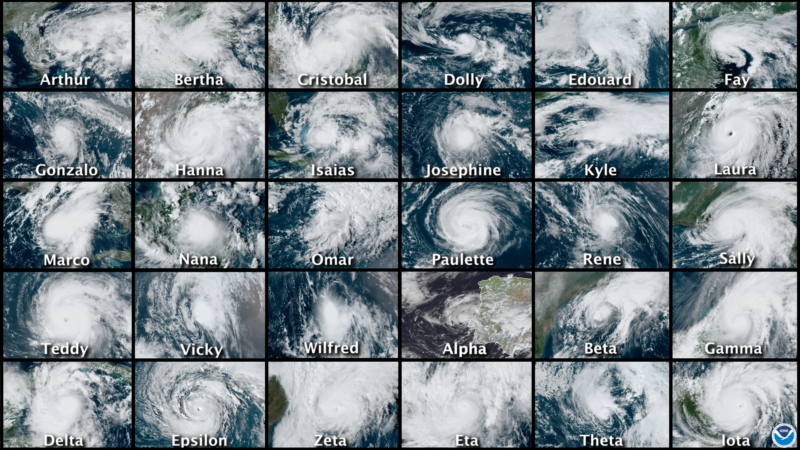Good riddance —
The United States saw a total of 12 landfalls. Louisiana, alone, experienced five.
Eric Berger
–

Enlarge / All of 2020’s tropical storms and hurricanes in a single image.
Monday was the last “official” day of the Atlantic hurricane season, drawing down the curtain on what has been a frenetic year for storms forming in the Atlantic Ocean, Gulf of Mexico, and Caribbean Sea.
The top-line numbers are staggering: there were a total of 30 tropical storms and hurricanes, surpassing the previous record of 28 set in the year 2005. For only the second time, forecasters at the National Hurricane Center in Miami ran out of names and had to resort to using the Greek alphabet.
Of all those storms, 12 made landfall in the United States, obliterating the previous record of nine landfalling tropical storms or hurricanes set in 1916. The state of Louisiana alone experienced five landfalls. At least part of the state fell under coastal watches or warnings for tropical activity for a total of 474 hours this summer and fall. And Laura became the strongest hurricane to make landfall in the Pelican State since 1856.
Not all records broken
By some measures, however, this season was not all that extraordinary. Perhaps the best measurement of a season’s overall activity is not the number of named storms but rather its “accumulated cyclone energy,” or ACE, which sums up the intensity and duration of storms. So a weak, short-lived tropical storm counts for almost nothing, whereas a major, long-lived hurricane will quickly rack up dozens of points.
The ACE value for the 2020 Atlantic season to date is 179.8—and another weak tropical or subtropical storm could still form. This is notably higher than the climatological norm for ACE values (about 104), but it would not quite make the top 10 busiest Atlantic seasons on record, which is paced by the 1933 and 2005 seasons.
In terms of estimated damages, this season has been far from a record-breaker as well. So far, damages across the Atlantic basin are estimated at $37 billion. This is substantially less than the devastating 2017 season, which included hurricanes Harvey and Irma and totaled more than $300 billion in damages. It is also less than 2005, which featured Katrina, Rita, Wilma, and other storms, topping $200 billion. One factor in 2020 was that most of the biggest storms missed heavily populated areas.
Also, the hyperactive Atlantic basin stands out amid the other basins where tropical activity typically occurs, including the northeastern and northwestern Pacific Ocean, which were much quieter than normal this year. Overall, in 2020, the Northern Hemisphere is seeing an ACE value about 20 percent below normal levels for a calendar year.
Legacy of 2020
Perhaps the biggest legacy of this Atlantic hurricane season is the disturbing trend of tropical storms rapidly developing into strong hurricanes. This “rapid intensification” occurs when a storm’s maximum sustained winds increase by 35mph or more within the period of 24 hours, and it was observed in 10 storms this year.
Moreover, three late season storms—Delta, Eta, and Iota—increased their speeds by 100mph or more in 36 hours or less. Iota, which slammed into Nicaragua on November 17, was the latest Category 5 hurricane on record in the Atlantic.
Some recent studies, including a paper published by Nature Communications in 2019, have found that climate change has goosed intensification. The study observed, for the strongest storms, that rate of intensification over a 24-hour period increased by about 3mph to 4mph per decade from 1982 through 2009. Storms that strengthen more quickly, especially near landfall, leave coastal residents and emergency planners with less time and information to make vital preparations and calls for evacuation.

